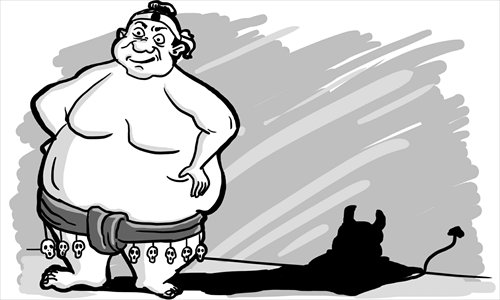Lack of true repentance leaves Japan's neighbors smarting

Illustration: Sun Ying
Like Japan, Germany is a nation that will forever bear the stigma of having murdered and enslaved millions of its neighbors.
But it has come a very long way since the Nazi regime. Former German chancellor Willy Brandt once surprised the world by kneeling down in order to beg the Poles for forgiveness.
And due to the sincerity of the process of German repentance, especially from the late 1970s onward, not even the Jews, who suffered the most under the Nazis, seem still to harbor hatred toward modern Germany.
A quick glance at what has come out of Japan in recent weeks shows that in East Asia it is a decisively different matter.
Mocking the Asian women who were forced into sexual slavery by Japan's imperialist armed forces in World War II, Tokyo Governor Shintaro Ishihara reportedly said at a press conference that wartime "comfort women" served Japanese troops because it is "a good means of making money in times of difficulty."
Prime Minister Yoshihiko Noda and Osaka Mayor Toru Hashimoto have also suggested that wartime sex slaves were merely prostitutes.
The latest prominent Japanese political figure to give his two cents, former Japanese prime minister Shinzo Abe, promotes the scrapping of a number of key official statements that were made in the 1980s and 1990s acknowledging Japanese wartime atrocities.
If a German government official was to be caught on record trampling the reputation of Nazi victims in a similar way, effectively sullying their character retrospectively, public and media outrage would blow him or her out of office in an instant.
In that country, any middle school music teacher who makes students hum only one verse of a Hitler Youth song faces at least disciplinary action. Quite frequently, Germany's provincial courts impose thousands of euros in fines on Holocaust deniers.
But in Japan, in stark contrast, the recent remarks by Ishihara, Noda, Hashimoto and Abe are irritatingly uncontroversial and fail to get anywhere near the domestic media's headlines. A significant liberal minority does protest ultra-nationalism, but this doesn't prevent such comments passing unnoticed.
When a 97-year-old Nazi war crimes suspect was hunted down in Hungary in July, and when around the same time German prosecutors opened an investigation into the past of a 91-year-old, who allegedly executed Ukrainian Jews 70 years ago, the two pieces of news grabbed a surprising amount of attention in South Korea.
The Internet forums run by Korean news outlets were overwhelmed by readers' comments despite the matter that Korea's past obviously does not have too much to do with the war crimes of the Nazis.
Yet the connection between those two very old men and Korea soon became apparent.
According to hundreds of Korean netizens, it is beyond imagination that Tokyo would act against Japanese war criminals in their 90s who committed crimes against humanity in Korea when they were in their 20s.
"The Japanese would help them to hide, not let them be dragged to court as the Germans do," the majority of Korean commentators concluded.
Like Germany, Japan has paid enormous amounts of reparations to its neighbors for the war of aggression it started.
Japan's Official Development Assistance Agency has given China nearly $40 billion in low-interest loans since 1979, according to the Japanese government.
But partially because these transfers have been accompanied by recurring outbursts of arrogance and blunt disrespect to the traumas of the victims, the positions Germany and Japan find themselves in among their neighbors could scarcely be more different.
Today, long after the end of World War II, the offspring of the German culprits can enjoy living on cordial terms with all of Europe and even with Israel, while the descendants of the latter are still forced to quarrel bitterly on at least two fronts, namely against South Korea and China.
Last Thursday, Japan's flag was ripped off the Japanese ambassador's car in Beijing, and the Global Times called the act "stupid." The Chinese Ministry of Foreign Affairs has pledged efforts to investigate the issue. The Beijing police are questioning suspects in connection with the incident.
In the eyes of this author, a German, such a display of disrespect against the flag of Japan is an outcome that can only be regarded as perfectly logical.
If a contemporary German leader said anything similar to the statements by Ishihara, Noda, Hashimoto and Abe just have, and the German public simply allowed his or her political career to continue, as the Japanese establishment has done in the cases of those four, who could possibly blame an angry Polish lad if he ripped the German flag off the ambassador's Mercedes in the streets of Warsaw?
The author is a Taipei-based journalist. opinion@globaltimes.com.cn